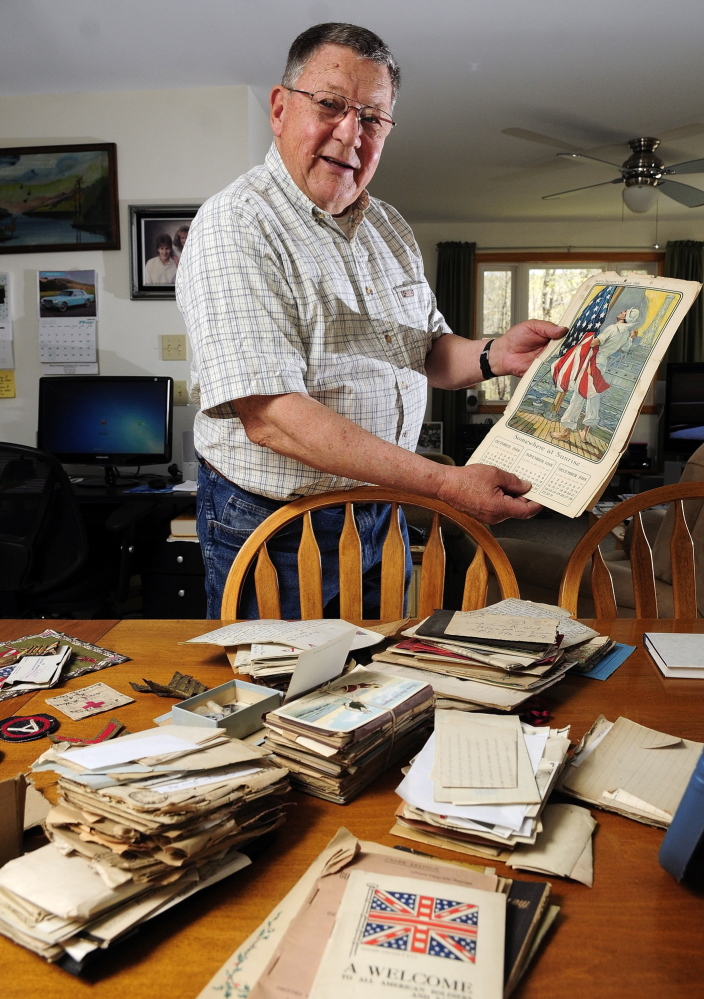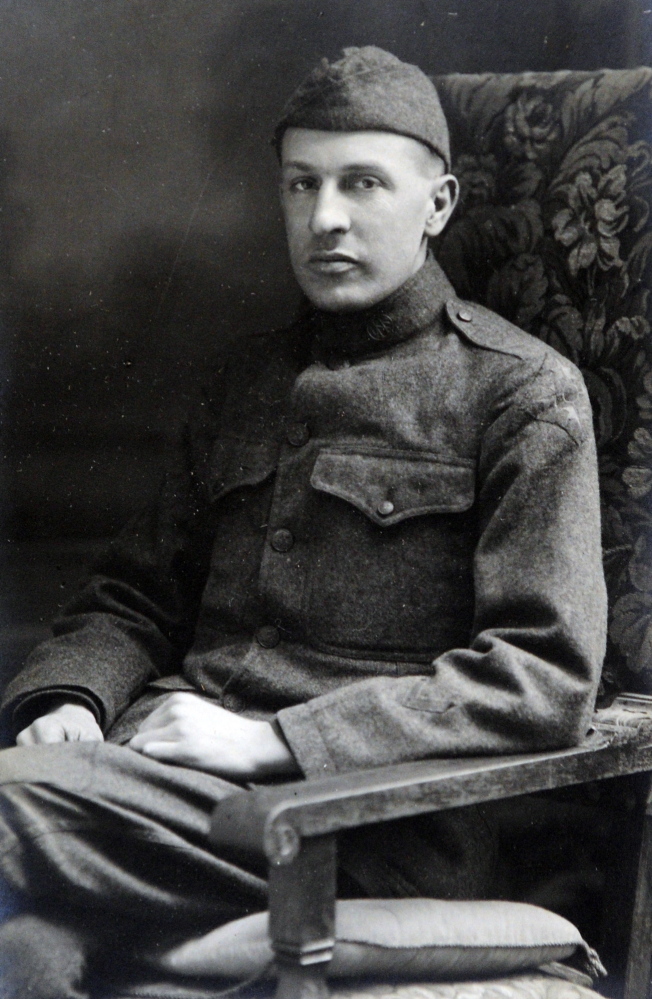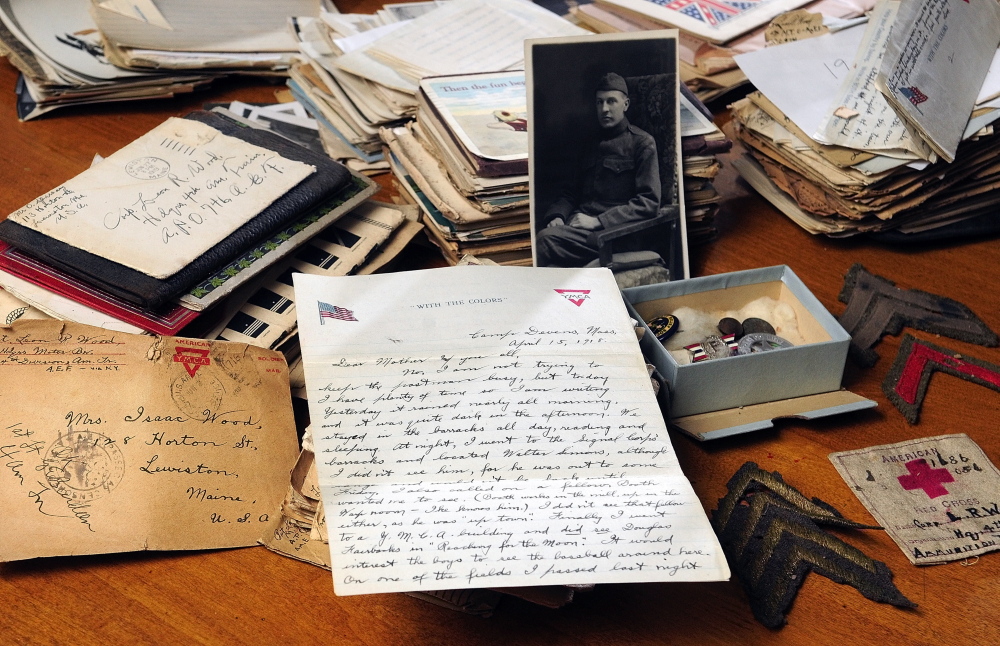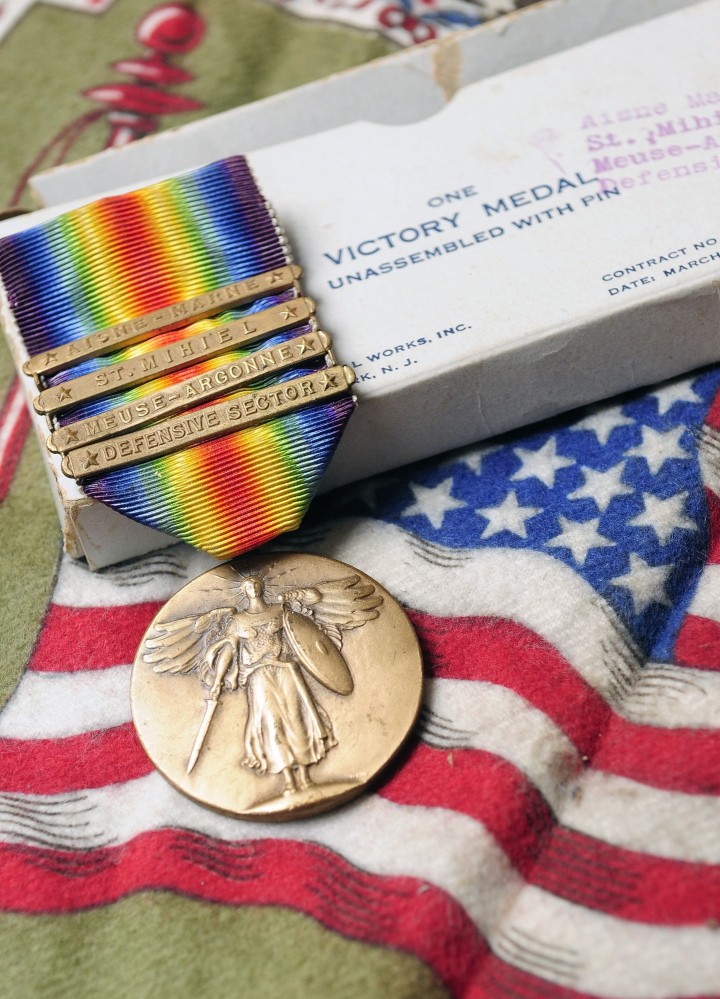WINTHROP — When Jim Wood, 76, of Winthrop, thinks about his own family and their contribution to the military service of this country, he often turns to a treasure trove of letters and poems penned by his uncle, Leon Roy Wood.
Leon served in the U.S. Army during World War I with the American Expeditionary Force in Europe. His unit kept the soldiers and officers in the front lines supplied with ammunition. Leon also served in the Army of Occupation after Germany had been defeated and signed the Armistice on Nov. 11, 1918.
What Leon left and was handed down to Jim is more than 100 letters Leon wrote to his mother, Elizabeth Wood, and the rest of his family. Leon also left numerous poems, including those published in a book called “Ramifications.”
“He loved people,” recalled Jim Wood, who is retired from a 34-year career with the Maine Air National Guard. “He did everything you could imagine for people. He loved to sing. He was just a great guy, a real American patriot.”
Leon ran a firewood business in Lewiston for many years after the Great War.
The motto for his business was, “If you want good wood, get your wood from Wood.” He died in 1981 at the age of 90.
In nearly every letter during World War I, Leon attempted to calm the worries of his family, claiming he was a long distance away from any scene of battle. When he got onto the battleground in France and served there for four months, he didn’t describe the carnage in his letters. He still described the scene behind the lines and the peaceful villages of France which had won his heart. He wrote of the “exceedingly attractive” women of Luxembourg and later of the “mighty nice” German country folk who hosted Leon and another U.S. soldier in their home and gave them apples and pears.
In May 1918, Leon was transferred by railroad train by day and night from Camp Devens in Massachusetts to Camp Merritt in New Jersey. At each stop, the boys would go out on the platform and “shake hands with the people there, especially the young ladies.”
By June 6, 1918, Leon had been transported across the Atlantic to a base in France. His letters were subject to government censors, but there’s no evidence that a censor ever blacked out anything Leon wrote. Apparently, he was not supposed to reveal his exact location, so his letters were always posted with vague place references like “Somewhere in France” or just “Germany.”
“Our official directions for writing letters are to write as much as you like, but don’t say anything,” Leon quipped. “I am still ‘way across the sea,’ but far away from any actual fighting line, so don’t worry, mother, over any imaginary dangers surrounding me. I shall remain here some time, so let your mind rest easy.”
Leon wrote in the same letter, “I have completely changed my opinion of France as a whole. The country districts are beautiful, some of the scenery is wonderful, but I do not like the old block houses that they live in.”
Leon’s handwriting is a graceful cursive style that is easy to read. Most of his stationery is stamped with the logo of the American YMCA, a group that also provided recreation halls for the Allied soldiers to take breaks in.
After the war, Leon had poetry published in the Lewiston Sun-Journal over the years and he won the Music Hall competition in Lewiston several times.
He also won some poetry contests at Old Orchard Beach.
Leon wrote all of his poems with alternating lines of verse that rhymed. The rhyming lines were always the same length.
“He obviously considered his words very carefully,” said Linda McKee, a former English teacher at Winthrop High School. “These poems are ballads with rhymed, metered verse. Soldiers often have difficulty expressing their emotions, but he was able to express his emotions through these poems.”
Leon’s father, Isaac, had died in 1909. His brother, Ernest Ogden Wood, Jim’s father, also was a World War I veteran, but he was not sent overseas.
Jim said Leon tried to re-enlist for service during World War II, arguing the service was taking married men with families and he was a single bachelor, but the officials told him he was too old for military service. He would have been 50 in 1941.
“My uncle was very close to his mother,” Jim said. “He had a bell hooked up so she could ring him at home if she had any problem.”
After he returned from the service, Leon and the rest of the Wood family jointly purchased some land on Wilson Pond in Winthrop and Monmouth and built a vacation camp on it. Later, they divided the land up among the remaining members of the family.
Leon was master of Kora Temple Shrine in Lewiston for a number of years, was a member of the Kora Temple Chanters and received his 50-year membership pin from Kora Temple.
Jim’s older brother, Cliff, now 95, served in the Maine Air National Guard, retiring as a colonel. He served on active duty during World War II and Korea. “He was brilliant in personnel management,” Jim said.
Another of Jim’s brothers, Don Wood, also had a career in the Air Force. He was an aerial photographer on B29s and B36s.
In the Air National Guard, Jim worked on repairing, maintaining and calibrating radar systems that fighter planes used to track their airborne foes. He worked on F-94s, F-89 Scorpions and F-101 Voodoos.
In 1976, after working 20 years in radar maintenance, Jim took on a new assignment. He was one of the first to operate refueling booms for midair refueling of B-52s and other planes out of KC-135 air tankers. The Maine Air National Guard took the lead in this work. It was based first at Loring Air Force Base in Limestone and later at the old Dow Air Force Base in Bangor.
Send questions/comments to the editors.







Success. Please wait for the page to reload. If the page does not reload within 5 seconds, please refresh the page.
Enter your email and password to access comments.
Hi, to comment on stories you must . This profile is in addition to your subscription and website login.
Already have a commenting profile? .
Invalid username/password.
Please check your email to confirm and complete your registration.
Only subscribers are eligible to post comments. Please subscribe or login first for digital access. Here’s why.
Use the form below to reset your password. When you've submitted your account email, we will send an email with a reset code.